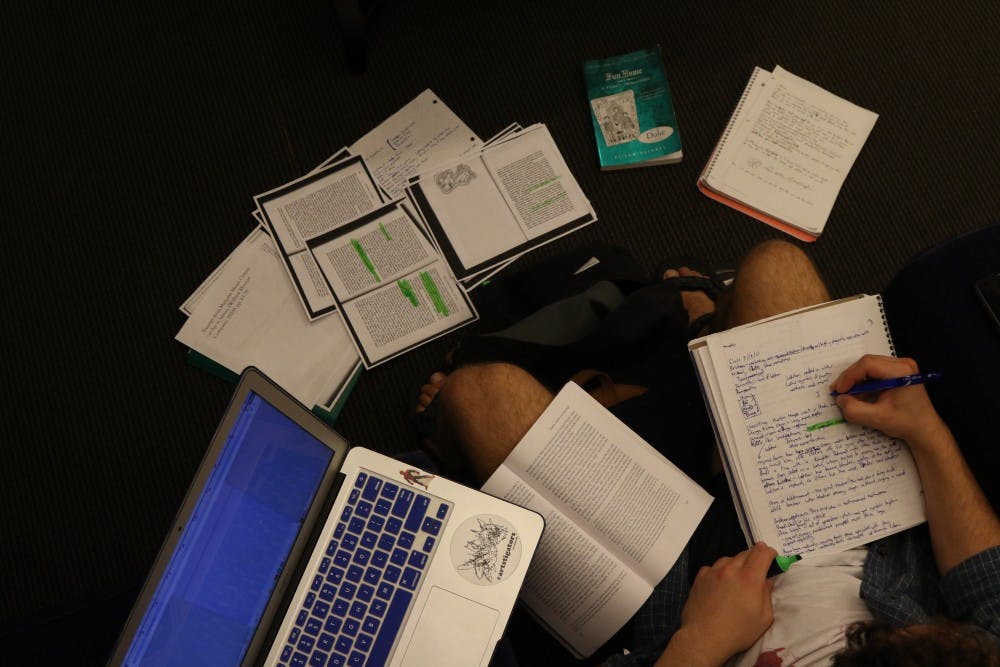The Arts & Sciences Council revamped the Trinity College of Arts & Sciences grading system in their Thursday meeting.
The Council approved a proposal by the Committee on Curriculum to allow students in Trinity to voluntarily convert any course they take from a letter-grade grading basis to satisfactory/unsatisfactory grading without instructor permission. Students will still need to receive permission from their academic dean and submit the grade conversion request by the withdrawal deadline.
Students may use this for no more than four credits of the 34 needed for graduation, and they cannot elect more than one course into S/U grading each semester. They may only convert the course to S/U if the professor does not declare no later than the first day of classes that their course cannot be converted to S/U that semester.
In an email obtained by The Chronicle, José María Rodríguez García, chair of the Council and associate professor of romance studies, wrote to Council members that this is a “permanent change to Trinity’s grading system” which has not yet been endorsed by the Pratt School of Engineering. He added that courses taken S/U will still carry general education or curricular codes—Modes of Inquiry and Areas of Knowledge—but individual departments must decide if a credit taken S/U fulfills any of the required courses of a student’s major or minor.
The new policy has an “open-ended implementations date,” García wrote. He wrote that this new system may not necessarily be established in fall 2021, “but rather when all four schools with representation in the Council and offering undergraduate instruction (Trinity, [Sanford School of Public Policy], [Nicholas School of the Environment], and Pratt) have coordinated their efforts and reconciled their information systems,” as well as worked with Duke Student Government to increase awareness of these changes and ensured that all information about the new policy is readily available to students and faculty.
The Council also approved a proposal by the Committee of Undergraduate Teaching, Academic Standards and Honors (CUT) for students to be able to automatically transfer summer 2021 courses taken online at other institutions that would normally be taught in person. Additionally, the proposal allows for spring 2021 courses taken by transfer students, pre-matriculation credits taken during the 2020-2021 academic year and study abroad courses taken through fall 2021 to receive credit. Students must show proof that the course they took was taught in person before the pandemic in order to complete the transfer of credit.
The Council also approved a framework for a new course evaluation form which will be brought forward for a vote in fall 2021. The new framework aims to increase student response rates, minimize issues related to bias and use both qualitative and quantitative questions to assess course outcomes. They hope to implement an “opt-out” system where the “default assumption is that students will in fact fill out course evaluations,” as opposed to the current “opt-in” system where students are not required to complete them.
The new platform was introduced in 30 undergraduate courses in spring 2021 and will be used for all undergraduate courses in summer 2021. Using lessons learned in these two sessions, the Committee on Assessment will propose a final model for Council approval.
In other business
García gave his end-of-term remarks to the Council, as he will step down as chair on May 14 after a three-year term. Joshua Socolar, professor of physics, will take over as chair.
García said in his speech that the Council is a place where opposing points of view can be brought to the table and noted that while members must find common ground, disagreement is the “nourishment of democracy.”
“Dare to disagree respectfully and cogently with the voices representing different interests and persuasions from your own, either in your department or program, in the Allen Building or on the floor of the Council,” he said. “Dare to disagree and be grateful for, and humbled by, the amazing opportunity to do so at a temple of academic freedom like Duke University, where respect for everyone’s perspective is one of our most cherished values.”
He said that he wanted for the composition of the Council and its committees to “reflect more faithfully the distribution of ranks” in Trinity; to have as many standing committees as possible so that “fewer executive decisions would be made at the [University] level without consulting faculty first;” and to use the support of more senior faculty members and the greater number of active committees to “articulate a truly pluralistic faculty voice.”
To accomplish these feats, García invited more tenure-line faculty to do work for the Council and encouraged chairs to get their associate and full professors to join the Council more often. He increased the number of active committees from six to nine.
Garcia told the Council they were in good hands with Socolar.
“The Council’s leadership could not possibly be in better hands for the next three years as [Trinity] and the University as a whole begin to resume near-normal operations and also get ready to write yet another chapter in the illustrious history of higher education in North Carolina,” he concluded.
Julie Reynolds, associate professor of the practice of the department of biology, gave an update on the CUT's implementation of the 2021 Arts & Sciences Council Faculty Teaching Awards.
Get The Chronicle straight to your inbox
Signup for our weekly newsletter. Cancel at any time.

Leah Boyd is a Pratt senior and a social chair of The Chronicle's 118th volume. She was previously editor-in-chief for Volume 117.

